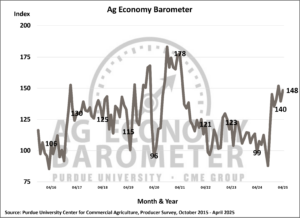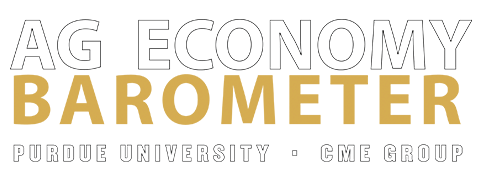Farmer sentiment improves as long-term optimism outweighs tariff concerns
WEST LAFAYETTE, Ind. — Farmer sentiment improved in April as producers expressed more optimism about current and future conditions on their farms. The Purdue University/CME Group Ag Economy Barometer rose 8 points to a reading of 148, up from 140 in March. The Index of Current Conditions climbed 9 points to 141, while the Index of Future Expectations increased 8 points to 152. The improvement in sentiment came amid ongoing tensions with many of U.S. agriculture’s largest trading partners, including Mexico and Canada. Notably, a majority of producers said they believe the increased use of tariffs will ultimately benefit the U.S. agricultural economy, a view reflected in the stronger future expectations reading. The April barometer survey took place between April 14-21.

Farmer sentiment improves as long-term optimism outweighs tariff concerns. (Purdue University/CME Group Ag Economy Barometer/James Mintert)
“Producers seem to be gaining confidence in the ag economy’s longer-term outlook in spite of concerns they have about the impact of tariffs,” said Michael Langemeier, the barometer’s principal investigator and director of Purdue University’s Center for Commercial Agriculture. “This month’s results suggest some producers are starting to look beyond near-term uncertainty and focus more on positioning their farms for the future.”
The Farm Capital Investment Index rose to 61 in April, a 7-point increase from March and the highest investment index reading since May 2021. Since the November 2024 election, there has been a marked shift in producers’ attitudes toward large investments. From May through October 2024, the index averaged just 36, while the average from November through April grew to 54 — a 50% increase from the previous six months. This month, 1 out of 4 producers said it was a good time to make large investments, nearly twice the percentage of respondents who said it was a good time to invest when surveyed from May through October last year.
Despite a rise in investment sentiment, nearly two-thirds of producers in April’s survey still said it was a bad time to invest, suggesting persistent caution among a majority of U.S. farmers. That group’s outlook helps explain the sharp decrease in new farm equipment sales that took place during 2025’s first quarter. According to the Association of Equipment Manufacturers, sales of tractors with over 100 horsepower fell 19% in the first quarter of 2025 compared to the same period in 2024, while new combine sales were down 38% from a year earlier.
The Farm Financial Performance Index held steady in April, dipping just 1 point from last month to a reading of 101. This marks the fourth consecutive month the index has remained above 100, indicating that producers, on average, continue to expect their farm’s financial performance this year to match or modestly exceed last year’s results.
Expectations for short-term farmland values weakened in April, as the index fell 8 points to a reading of 110. This change was driven by a decrease in the number of producers anticipating higher farmland values in the coming year, balanced by a comparable increase in the percentage of producers expecting values to remain about the same.
The April survey included several questions focused on the impact of the U.S.’s tariff policy on U.S. agriculture. Even with the improvement in overall sentiment, farmers remain concerned about the near-term effects of U.S. trade policy. Over half (56%) of respondents said they expect the U.S. tariff policy to have a negative or very negative impact on their farm’s income in 2025, and 53% anticipate some difficulty in obtaining inputs as a result of higher import tariffs. Among those expecting supply challenges, fertilizer was the primary cited concern, followed by parts for farm machinery and electronics and crop chemicals.
Despite the concerns expressed by farmers in the April survey about the impact of tariffs on farm incomes and availability of inputs for their farm operations, 70% of respondents said they expect the increased use of tariffs to strengthen the U.S. agricultural economy over the long term.
About the Purdue University Center for Commercial Agriculture
The Center for Commercial Agriculture was founded in 2011 to provide professional development and educational programs for farmers. Housed within Purdue University’s Department of Agricultural Economics, the center’s faculty and staff develop and execute research and educational programs that address the different needs of managing in today’s business environment.
About CME Group
As the world’s leading derivatives marketplace, CME Group (www.cmegroup.com) enables clients to trade futures, options, cash and OTC markets, optimize portfolios, and analyze data – empowering market participants worldwide to efficiently manage risk and capture opportunities. CME Group exchanges offer the widest range of global benchmark products across all major asset classes based on interest rates, equity indexes, foreign exchange, energy, agricultural products and metals. The company offers futures and options on futures trading through the CME Globex® platform, fixed income trading via BrokerTec and foreign exchange trading on the EBS platform. In addition, it operates one of the world’s leading central counterparty clearing providers, CME Clearing.
CME Group, the Globe logo, CME, Chicago Mercantile Exchange, Globex, and, E-mini are trademarks of Chicago Mercantile Exchange Inc. CBOT and Chicago Board of Trade are trademarks of Board of Trade of the City of Chicago, Inc. NYMEX, New York Mercantile Exchange and ClearPort are trademarks of New York Mercantile Exchange, Inc. COMEX is a trademark of Commodity Exchange, Inc. BrokerTec and EBS are trademarks of BrokerTec Europe LTD and EBS Group LTD, respectively. The S&P 500 Index is a product of S&P Dow Jones Indices LLC (“S&P DJI”). “S&P®”, “S&P 500®”, “SPY®”, “SPX®”, US 500 and The 500 are trademarks of Standard & Poor’s Financial Services LLC; Dow Jones®, DJIA® and Dow Jones Industrial Average are service and/or trademarks of Dow Jones Trademark Holdings LLC. These trademarks have been licensed for use by Chicago Mercantile Exchange Inc. Futures contracts based on the S&P 500 Index are not sponsored, endorsed, marketed, or promoted by S&P DJI, and S&P DJI makes no representation regarding the advisability of investing in such products. All other trademarks are the property of their respective owners.
About Purdue University
Purdue University is a public research institution demonstrating excellence at scale. Ranked among top 10 public universities and with two colleges in the top four in the United States, Purdue discovers and disseminates knowledge with a quality and at a scale second to none. More than 105,000 students study at Purdue across modalities and locations, including nearly 50,000 in person on the West Lafayette campus. Committed to affordability and accessibility, Purdue’s main campus has frozen tuition 13 years in a row. See how Purdue never stops in the persistent pursuit of the next giant leap — including its first comprehensive urban campus in Indianapolis, the Mitch Daniels School of Business, Purdue Computes and the One Health initiative — at https://www.purdue.edu/president/strategic-initiatives.
Sources and Notes block:
Writer: Morgan French
Source: Michael Langemeier, mlangeme@purdue.edu, 765-494-9557
Media Contacts:
Aissa Good, Purdue University, aissa@purdue.edu, 765-496-3884
Dana Schmidt, CME Group, dana.schmidt@cmegroup.com, 312-872-5443
Agricultural Communications: Maureen Manier, mmanier@purdue.edu, 765-494-8415


